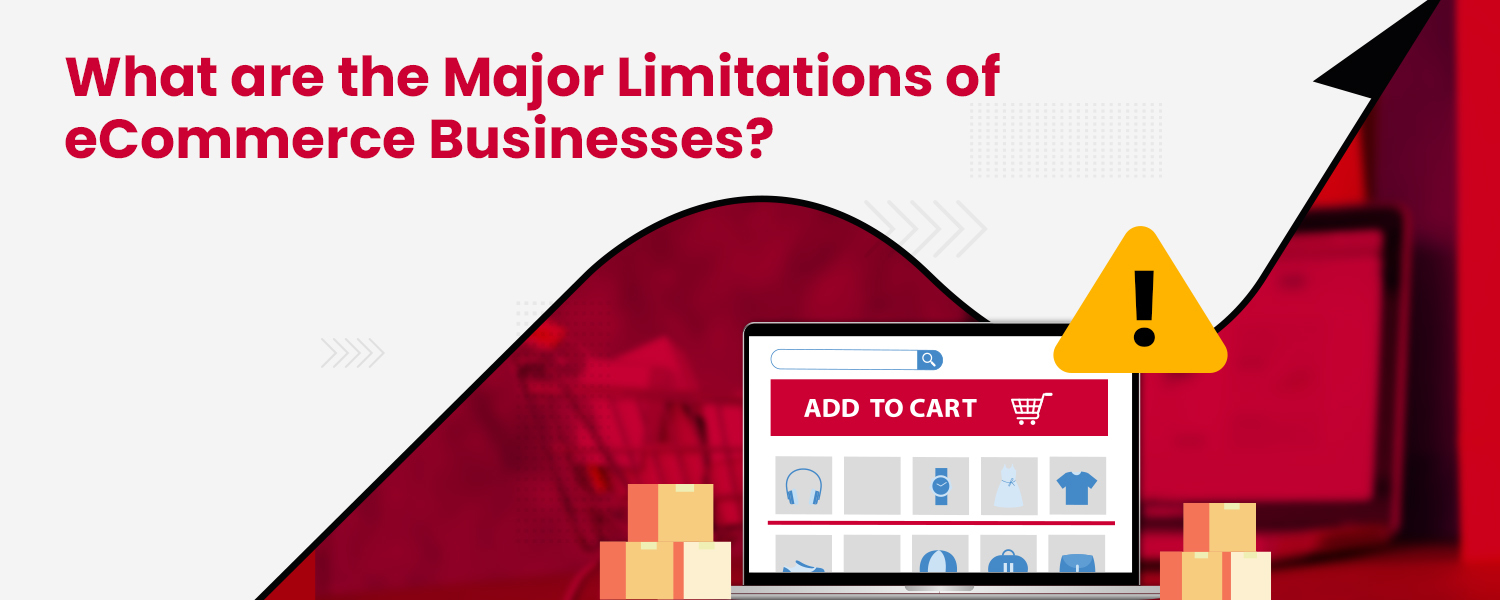Just like Netflix and Instagram, online shopping is an integral part of our life. People are now addicted to ordering online; from toothbrushes to smartphones– we buy almost everything online. There are undoubtedly numerous advantages of eCommerce, but there are also limitations of e-business that eCommerce, but along with that, there are limitations of e-business too which cannot be understated.
eCommerce and selling online is not everyone’s cup of tea. Today this industry is one of the most competitive. However, if you solve a problem genuinely, you’ll have a chance to build a significant business. In this blog, we’ll discuss some of the limitations of eCommerce or e-business that persist.
Key eCommerce Limitations
Huge Technological Cost
With the increasing reliance on advanced technology, businesses must invest a lot of money in hardware, software, and high-speed internet connectivity. This can be a huge financial burden for small businesses or eCommerce startups, but it’s essential for staying competitive in the online marketplace. Another technological limitation that eCommerce businesses face is security concerns. With online businesses being a prime target for cyber attacks, it’s crucial to have robust cybersecurity measures in place. This includes measures like firewalls, encryption, and two-factor authentication. However, these measures can also add to the overall technological costs.
There are ways to minimize these costs. For instance, you can opt for cloud-based solutions that offer scalable and affordable services. You can also consider outsourcing some of your technology needs to third-party vendors who specialize in providing such services at lower costs.
Employee and Operating Costs
One of the limitations of running an eCommerce business is the operational expenses involved in keeping the business running. From hiring employees to managing your website to running marketing campaigns and optimizing your site for search engines, the cost of maintaining an eCommerce website can be quite high. These expenses can impact your profitability if not managed effectively. One way to address this is by outsourcing some of these tasks to third-party vendors. For instance, you can hire a digital marketing agency to handle your marketing campaigns or use a website builder platform with built-in SEO tools.
Marketing and Advertising Costs
One of the most significant challenges facing small eCommerce businesses is the high cost of online advertising platforms like Google and Facebook. These costs can make it challenging for small businesses with limited budgets to compete with larger brands. However, there are ways to get around this. Social media platforms like Instagram, Twitter, and Facebook offer affordable advertising options that allow you to target your audience effectively. You can also collaborate with influencers to promote your products or services to their followers.
eCommerce Policies and Delivery Guarantees
Complicated policies, such as confusing return processes or unclear refund policies, can frustrate customers and may result in lost sales. That’s why it’s important to have clear and concise policies that are easy to understand. For example, simplify your language and break down your policies into easy-to-digest sections, or use visuals like infographics and videos to help explain them.
Regarding delivery guarantees and policies, customers want to know that their products will arrive on time and in good condition. Offering free shipping or expedited delivery options can incentivize customers to purchase from your online store. Additionally, providing tracking information and timely updates on their order status can help keep them informed and reduce anxiety.
Fear and Trust Issues
Online shoppers are often worried about the safety and security of their personal information and payment details. This fear can arise due to fraud and data breaches that frequently occur online. These concerns can lead to a lack of trust in your business and discourage customers from purchasing from your store. So, to address this issue, it’s crucial to implement effective fraud prevention measures that can protect your customers’ data and payment information. You can achieve this by using secure payment gateways, implementing two-factor authentication, and conducting regular security audits to identify potential vulnerabilities.
Moreover, building trust with your customers is crucial to providing excellent customer service, offering transparent policies, and being responsive to customer feedback. By building a strong relationship with your customers, you can create a positive reputation for your brand and establish yourself as a trusted and reliable eCommerce business.
Technical Issues
One of the most significant technical issues that can impact your eCommerce business is website downtime, slow load times, and errors. These issues can lead to a frustrating user experience, causing potential customers to abandon their shopping carts and look for other options. So, to avoid this, it’s essential to invest in a reliable hosting provider, and regularly monitoring your website’s performance is essential. In addition, make sure to have a backup system in place to address any technical issues that may arise quickly.
Managing and maintaining complex eCommerce platforms and systems can also be a challenge. Therefore, ensuring that your eCommerce platform is user-friendly, reliable, and easily customizable is crucial. This will help streamline your business operations and provide a seamless shopping experience for your customers.
Lack of Personal Touch
Unlike brick-and-mortar stores, where customers can interact with sales associates and touch and feel products before making a purchase, eCommerce businesses rely solely on virtual interactions. This lack of personal touch can make building strong relationships with customers difficult and can negatively impact customer satisfaction and loyalty.
However, there are ways to overcome this limitation. One way is to provide exceptional customer service through various channels such as email, chat, and phone. By responding promptly and empathetically to customer inquiries and complaints, eCommerce businesses can build trust and loyalty with their customers.
Logistics Limitations
Delays and damage to products during the shipping process can cause frustration and disappointment among customers. It’s essential to have a reliable shipping provider and a tracking system to minimize these issues. Make sure to communicate the estimated delivery time and provide regular updates to your customers to keep them informed.
Another logistics limitation is the limitation on shipping to certain areas. Some shipping providers may not deliver to remote or international locations, which can affect your business’s reach. You may want to consider partnering with multiple shipping providers or finding alternative shipping methods to expand your shipping options.
Payment Processing
Payment processing is an essential aspect of eCommerce businesses. However, it comes with its set of challenges that can negatively impact the profitability and reputation of the business. For example, late payments can lead to delayed deliveries, which can ultimately affect the customer’s satisfaction with the business. Similarly, payment disputes can also arise, which can create friction between the business and the customer.
Fraudulent activities such as chargebacks, identity theft, and other scams can significantly affect the business’s finances and reputation. As an eCommerce business owner, it is crucial to have robust payment processing systems to detect and prevent fraudulent activities.
Therefore, it is important to partner with reputable payment processing providers and implement fraud prevention measures to safeguard the business’s financial interests. By doing so, eCommerce businesses can ensure timely and secure payment processing, ultimately leading to increased customer satisfaction and loyalty.
Product Quality and Customer Reviews
Customers rely heavily on online reviews before making a purchase, and negative reviews can significantly impact your sales. Therefore, it’s important to ensure that your products meet high-quality standards and address any issues that arise promptly. One way to ensure product quality is by implementing quality control measures throughout your supply chain. This includes conducting thorough product testing, working with reputable suppliers, and regularly checking your inventory for defects. It’s also important to listen to customer feedback and address any concerns they may have about product quality.
Encouraging customers to leave reviews after purchase can help increase trust and build a positive reputation. Responding to negative reviews promptly and addressing any issues can also help improve customer satisfaction and loyalty.
Customer Service
As an eCommerce business owner, building a loyal customer base and increasing sales is crucial to ensuring that customers feel valued and heard. However, providing customer service can be challenging, especially when addressing customer concerns and issues. In addition, delayed response times, inadequate support, and poor communication can negatively impact customer satisfaction and loyalty.
So, to overcome this limitation, it’s essential to have a dedicated customer service team and systems in place to address customer needs and concerns. By prioritizing customer service, eCommerce businesses can build a positive reputation, establish a loyal customer base, and improve their profitability.
Conclusion
eCommerce has transformed the way we shop and do business. However, as an eCommerce business owner, it’s essential to be aware of these limitations and work towards overcoming them to succeed. By providing excellent customer service, managing operating costs effectively, and having clear eCommerce policies and delivery guarantees, you can build trust with your customers and establish a loyal customer base. Additionally, keeping up with emerging trends and technologies can help you stay ahead of the competition and take advantage of the vast potential for growth in the eCommerce industry. With the right strategies and mindset, the sky’s the limit for your eCommerce business.




